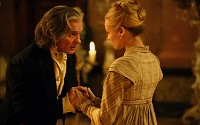
scr Stephen J Rivele, Christopher Wilkinson
with Ed Harris, Diane Kruger, Matthew Goode, Phyllida Law, Joe Anderson, Ralph Riach, Bill Stewart, Angus Barnett, Matyelok Gibbs, Viktoria Dihen, Nicholas Jones, Karl Johnson
release US 10.Nov.06,
UK 17.Aug.07
06/Hungary MGM 1h44

Yes, maestro: Harris and Kruger



 Blending fact and fiction for a biopic of someone as high-profile as Ludwig van Beethoven is a fairly risky move. While much of this film is intriguing and nicely performed, it also feels rather strained and corny.
Blending fact and fiction for a biopic of someone as high-profile as Ludwig van Beethoven is a fairly risky move. While much of this film is intriguing and nicely performed, it also feels rather strained and corny.
In 1824 Vienna, Anna Holtz (Kruger) is an aspiring composer who's overwhelmed to be working as a copyist for her hero Beethoven (Harris), even if her aspiring architect boyfriend (Goode) thinks his music is old and tired. But the vain, unruly Beethoven is working on his groundbreaking 9th Symphony, and Anna provides him a feisty sounding board. As their tenuous friendship develops, Anna discovers something important about the artist within herself.
The filmmakers use the fictional character of Anna to explore Beethoven's dark side--the demanding, primadonna behaviour that drew people toward him and sent them running away in disgust. Harris plays this with a flash of personality, floppy hair and growly voice. He's fascinating to watch on screen, and his interaction with the superb Kruger sparks with energy. Although in some ways Harris' role is all about his physicality, while Kruger's is all about her telling silences.
In using a female copyist as the central character, the filmmakers take a strongly anachronistic point of view, observing that such a thing would have been impossible in this society (women couldn't be copyists, let alone composers). But this also gives the film a level of interest it couldn't have otherwise. And the extended sequence featuring the premiere of the 9th Symphony has a startling resonance, as we watch Anna helping the deaf Beethoven conduct his orchestra.
Holland also uses all manner of directorial inventiveness to spice up the story, from edgy camera work to ironic editing and a kind of grubby production design. At times this is remarkably effecting, but some scenes feel stiff and awkward. And the film strains to prove how Beethoven's later compositions were so avant-garde that people of the time just couldn't get them--but we can. In the end, while the film is perfectly entertaining, this hindsight condescension feels more than a little misguided. And it makes us want to know the real story.
 |
themes, language, innuendo | 22.May.07 |

 Still waiting for your comments ... don't be shy.
Still waiting for your comments ... don't be shy.
HOME | REVIEWS | NEWS | FESTIVAL | AWARDS | Q&A | ABOUT | TALKBACK